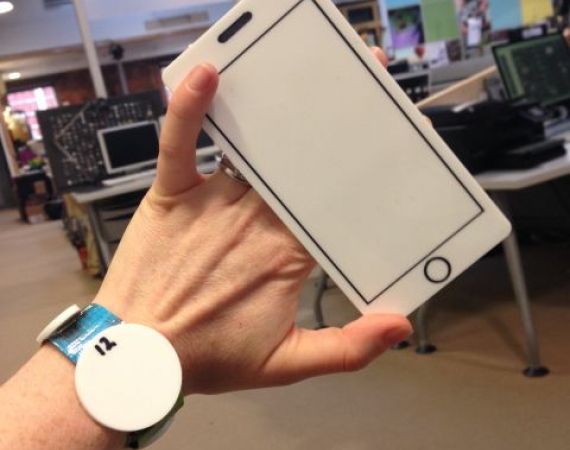Lunchtime talk write-up
Posted on Mon 14 Sep 2015
PowerStream – Mobile Power as a Sharable Commodity: lunchtime talk write up
On Fri 11 Sept we were joined by Jarrod Knibbe, Diego Martinez and Paul Worgan from the Bristol Interaction and Graphics group at the University of Bristol as they introduced us to PowerStream, a new approach to sharing power across mobile devices. Here are the five things I…

'Smart watch' and 'smart phone' dummies for experimentation
Posted by
On Fri 11 Sept we were joined by Jarrod Knibbe, Diego Martinez and Paul Worgan from the Bristol Interaction and Graphics group at the University of Bristol as they introduced us to PowerStream, a new approach to sharing power across mobile devices. Here are the five things I learned:
1. If we combined the power of all of the phones in this room, we could make about seven cups of tea (given that there are about 30 of us here, there is going to be an argument over who gets a brew).
What this tells us is that although we in the UK now carry a large quantity of phones, tablets, smart watches etc around with us, the battery capabilities of our mobile devices are still relatively low. We can all relate to running out of juice mid-afternoon, having only unplugged it from the wall at breakfast. Thinking about how many cups of tea we could all make with our collective power started us thinking about how we could view our charge as a sharable, perhaps tradable resource.
2. You can buy a table from Ikea with an induction pad that will charge your phone wirelessly. Upon further inspection you can get a pretty nice lamp too.
The team from BIG lab have taken the principle of induction charging, a one-way transfer from mains connected table to device, and transformed it into a two-way system, allowing personal devices to charge one another. This opens the door to gifting your phone charge to someone is greater need, or topping up one of your ailing devices with another.
3. Asking a stranger for help is more than a technical challenge
One of the scenarios that this new charge-sharing tech makes possible is that you could approach a stranger on the street and ask them for, perhaps 10% of their battery to get you out of a bind. The team brought along some laser-cut dummy phones and watches for us to play with, featuring potential connector designs.
They invited us to play out various scenarios, from friends swapping charge over coffee, to a scenario in which your boss is furious at you and you need to phone the office immediately to keep you job, and have to ask a random stranger for help*. It turned out most of us would not feel comfortable doing this without any prior relationship, and would be a little suspicious about anyone who asked us to give up our charge. The nervousness stemmed, not from a reluctance to share battery power, but from concern that the request might be a thinly veiled attempt to steal your device, data theft by stealth or a delivery mechanism for malware.
4. We might be willing to sacrifice one persons privacy to overcome our own anxieties about personal space and intimacy
One of our experiments with the dummy devices involved coupling our smart watches with another persons phone whilst they had it to their ears so that the call could be continued. This felt quite intimate, like cupping someone’s face in your hand. Some members of the audience suggested that in this instance they would be more likely to put the call onto speaker phone, possibly without the knowledge of the person on the phone, to allow the coupling to happen at a less intimate distance. This posited the notion that we would effectively compromise the privacy of the caller in exchange for a less embarrassing gesture.
5. We like the idea of altruism but we prefer the notion of karma
The team asked if we would be more inclined to offer our precious cargo of battery life to another if there were a micro-payment system built in. This was met with a resounding silence, and someone suggested that it would feel a bit like when a drunk person offers you a pound for a cigarette. Generally speaking we would rather just give it as a gift, or politely decline. What we did find interesting, however, was the idea that you could somehow see how much the person asking for help has gifted in the past, and if we could see that they had been generous with others, we would be much more likely to trust and to help them. A sort of karmic/pay it forward approach to benevolent power sharing. Could be an interesting model to explore for the BIG team as they continue to develop this technology.
*there was some debate about how urgent of a situation this would be. It seemed to depend on your job and your boss as to whether you regarded this to be an urgent situation. Alternatives suggested included a hostage situation, where any break in the call to recharge could result in a loss of life; similarly talking someone down from a ledge; or in a less dramatic way, comforting a child who has awoken away from home with a nightmare. In each case, some felt that they would ask a stranger for help to avoid dropping the call.
